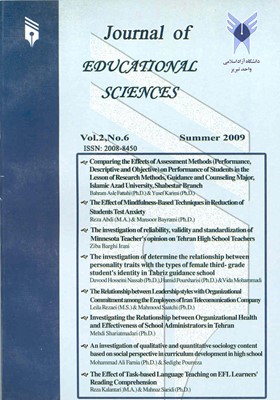The Effect of Mindfulness-Based Techniques in Reduction of Students Test Anxiety
Subject Areas : Educational PsychologyBahram Asle Fattahi 1 , Yusef Karimi 2
1 - دانش آموخته دانشگاه آزاد اسلامی واحد علوم و تحقیقات
2 - عضو هیات علمی دانشگاه آزاد اسلامی واحد علوم و تحقیقات تهران
Keywords: Anxiety, test anxiety, mindfulness, CBT,
Abstract :
Background and Objective: Considering the high prevalence of test anxiety and its negative effect on achievement performance, so far various methods of psychological intervention have grown. This study aimed to assess the impact of mindfulness-based techniques in reducing student’s anxiety was conducted. Materials and Methods: The present study after random assignment of 11 subjects in the experimental group exposed to training mindfulness-based techniques and 11 subjects in the control group, by experimental pre-test - post test with control group design was conducted. Spielberger Test Anxiety Inventory (STAI) for assessment of subjects test anxiety was used. Results: To examination research hypothesis and analysis of results, data statistically was analyzed by analysis of variance method with repeated measurements in a 2 × 2 design. Comparisons showed significant differences (p> .001) between test anxiety scores in two groups following conduction of interventional methods, so that the experimental group has been shown significantly decrease in the level of Test anxiety compared with the control group. Conclusion: The results of this study, consistent with the research hypothesis indicate that group training sessions of mindfulness-based techniques causes significantly reduction in students test anxiety.
- دلاور، علی. (1384). مبانی نظری و عملی پژوهش در علوم انسانی و اجتماعی (ویرایش جدید). تهران: انتشارات رشد.
- رضایی، اکبر.(1385). تاثیر ارزشیابی توصیفی بر ویژگیهای شناختی، عاطفی، روانی، حرکتی دانش آموزان پایه سوم ابتدایی شهر تهران. رساله دکتری .دانشکده روان شناسی و علوم تربیتی، دانشگاه علامه طباطبایی.
- سیف، علی اکبر. (1384). سنجش فرایند و فراورده یادگیری: روش های قدیم و جدید. تهران: نشر دوران.
- فتح آبادی، جلیل.(1385). بررسی تاثیر روش های متفاوت سنجش بر رویکردهای مطالعه و راهبرد های آماده شدن برای امتحان در دانشجویان با پیشرفت بالا و پایین. رساله دکتری، دانشکده روان شناسی و علوم تربیتی، دانشگاه علامه طباطبایی.
- Marton, F. and Saljo, R. (1976a), on qualitative differences in learning I: Outcome and process, British Journal of Educational Psychology, 46, p. 4-11.
- Marton, F. and Saljo, R.(1976b),On qualitative differences in learning II: Outcome as a function of the learner, s conception of the task, British Journal of Educational Psychology, 46, p. 115-127..
- Popham, W.J.(2002),Classroom assessment: What teachers need to know? (3rd ed.). Boston: Allyn and Bacon.
- Schouler, K.(1998), The influence of assessment method on student,s learning approach: Multiple choice examination versus assignment essay. Journal of Higher Education, 34, 453- 472.
- Thorndike, R.M. Cuningham, G.K., Thorndike, R.L., & Hagen, E.P.(1991),Measurement and evaluation in psychology and education) 5th ed.). Macmillan International Educations.
- Thomas, P.R. & Bain, J.D. (1984), Contextual differences of learning approaches: the effects of assessment, Human Learning, 3, 227-240.
- Traub & MacRury. (1990), Effects of Response Format on Diagnostic Assessment of Scholastic Achievement. Applied Psychological Measurement. Vol, 16, NO.4,pp:353-363.
- Woolfolk, A.E. (2004), Educational Psychology. (9tth Ed.). Pearson, International Edition.

